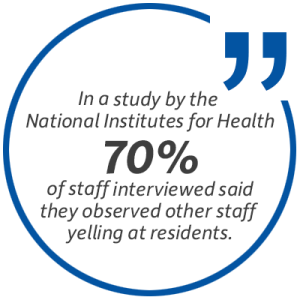Emotional abuse should never be taken lightly. Though physical abuse can leave behind noticeable scars, emotional abuse can sometimes be even more damaging.
If your loved one is being emotionally abused in their nursing home, you should report the issue and get help immediately. If left to suffer for too long, emotional abuse can cause nursing home residents to develop severe mental health issues that can impact them long-term.
At Crossen Law Firm, our Indianapolis nursing home abuse lawyers understand how upsetting and traumatizing these cases can be and are here to help. If you suspect your loved one is being emotionally abused, contact us today to set up a free consultation.
Understanding Emotional Abuse of Elderly
Emotional abuse is something that occurs when a person inflicts trauma on another person in non-physical ways. This form of abuse can be both verbal and non-verbal but can be just as damaging as physical abuse, if not more so.
Elder emotional abuse can occur in any setting, but most often occurs in care or assisted living facilities where staff abuse their positions of power over residents. Assisted living abuse is quite common, unfortunately, because residents are completely vulnerable and reliant upon the staff who take care of them.
Emotional abuse in a nursing home can happen both intentionally or unintentionally. For example, if staff members are overworked and tired, they might unintentionally take their frustrations out on their patients by speaking harshly to them. Staff might also intentionally abuse their patients, such as by deliberately isolating a patient to punish them.
Whether intentional or not, however, emotional abuse in any form is not acceptable and can have severe consequences and cause lasting damage.
Types of Emotional Abuse in Nursing Homes
Again, emotional abuse in nursing homes can be both verbal and non-verbal. For example, a staff member yelling at a patient would be verbal abuse, while intentionally ignoring a patient and purposely isolating them is a form of non-verbal abuse.

Some of the many ways that emotional abuse can occur in a nursing home can include:
- Yelling at residents
- Harassing, mocking, or ridiculing residents
- Shaming residents
- Making demeaning comments about a resident
- Accusing or blaming residents, especially for things that are not their fault or are out of their control
- Purposely embarrassing residents
- Using intimidation on residents
- Talking down to residents as if they are a child
- Threatening to harm a resident
- Restricting a resident from certain activities
- Isolating a resident and not allowing them to have visitors
- Taking or hiding personal belongings from a resident
- Ignoring residents or giving them the silent treatment
- Keeping residents from interacting with other residents
- Limiting a resident’s access to basic necessities
These are just several of the many different ways a person can be emotionally abused in a nursing home. In a way, emotional abuse is a form of psychological manipulation that can have lasting and serious damage to a person’s mental health.
Signs Your Loved One May Be Experiencing Emotional Abuse
In many cases, nursing home depression can happen when residents are emotionally abused for too long, leading to issues with self-harm or even suicidal thoughts. As such, you must learn to recognize the warning signs of emotional abuse in case your loved one is a victim.
Below is a list of behaviors that could indicate emotional abuse may be occurring:
- Withdrawal
- Disinterest in being social
- Disinterest in activities that once brought joy
- Agitation
- Anxiety or panic attacks
- Unexplained worsening of physical or mental health conditions
- Fear of being alone or fear of being around a particular person
- Nervousness
- Being quiet or passive more often
- Increased sadness or depression
- Self-neglect or self-harm
- Trouble sleeping or changes in sleep pattern
- Not eating
There may also be signs that can come from the staff that may indicate they are abusing your loved one. This can include restricting you from seeing your loved one, hostile or evasive reactions when you ask questions, a lack of concern, or faked or exaggerated concern or empathy. If the nursing home is understaffed, this could also lead to staff being overworked and taking their frustrations out on your loved one.
Reporting Emotional Abuse in Nursing Homes
You must report any suspected emotional abuse right away. Nursing home residents need family and friends to advocate for them as they often cannot advocate for themselves. If they are left to be abused, it can seriously damage their mental health and can even lead to their physical health declining rapidly.
First, you should report the issue to the nursing home administration and talk to them about what’s going on. Next, you should report the abuse to the police so an official report can be filed and the nursing home can be investigated.
Indiana also has an Ombudsman program, which can assign someone to your case and help with investigating the nursing home. Plus, you can file a complaint with Adult Protective Services. And last, you should contact a lawyer who can protect your rights and the rights of your loved one.
Should you need to file a claim or a lawsuit, a lawyer can help you gather evidence and build a strong case against the negligent party. They can also ensure you and your loved one are fully compensated for the damages you have suffered, such as the cost of medical expenses to help treat the effects of the emotional abuse.
Consult an Indianapolis Emotional Abuse Nursing Home Lawyer
If you suspect your loved one is being emotionally abused in their nursing home, we are here to help. At Crossen Law Firm, our Indianapolis personal injury lawyers have over 20 years of experience fighting for victims of abuse, including those in nursing home settings. We know what it takes to ensure our client’s rights are protected and will do everything we can to get you the settlement you deserve.
Contact us online today or give us a call for a free consultation at (317) 401-8626.

 317-401-8626
317-401-8626 
.jpg)